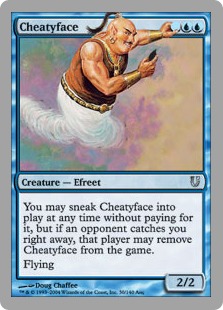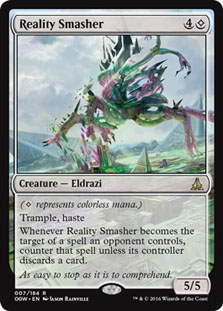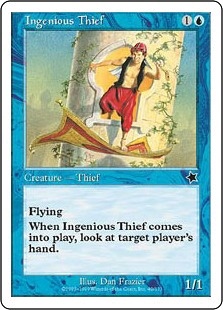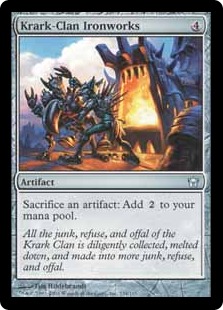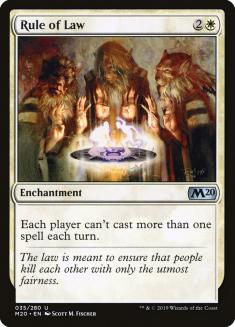Every now and then, I feel the need to put the Islands down and get real with my readers. I’ve written articles that addressed the poor path Organized Play chose to go down at various times, helped competitive players deal with the mental burden of tournament play through my experiences, and attempted to shine a light on specific types of play that violate the spirit of the game. This article will address that last scenario, as there have been some examples of play that I have always condemned from an ethical viewpoint, although they remain within the rules framework.
Angle shooting is a term that came from poker and is defined as using unethical, intentionally deceptive tactics to take advantage of opponents. Although poker is a different game from Magic, angle shooting is alive and well in both arenas of competition. In Magic, angle shooting has adopted some additional meanings beyond the original poker definition.
Magic is a game that is completely reliant on communication. When you check for spells to resolve, move through phases, resolve triggers, activate abilities, and the list goes on, the opponent has an opportunity to respond. Due to the amount of required communication between two players, there are often errors that require a judge to come restore the game state to its proper place.
Simple miscommunication is something that can happen in most games, but it is actively more common in Magic than others. Therefore we need a floor full of judges for large-scale tournaments to explain how cards work, resolve communication discrepancies, and watch for foul play. Players who purposefully break the rules of the game are typically disqualified when the intent is discovered. Unfortunately, deliberate miscommunication isn’t on its own “cheating.” This is where we get into the nitty-gritty of what angle shooting is, as we look at how players bend the boundaries of the game to achieve wins.
I must preface with how angle shooting is not cheating. Calling an angle shooter a cheater is unfair if the rules of the game are written in a way that allows for this type of behavior. I personally would never engage in this type of play, but many of the competitive players out there would. Not only would they angle shoot, they would also be on the front lines defending the play as completely clean, which it is not.
This article idea stemmed from an interaction I saw on Twitter a few weeks ago. I will not be using names because the action is what needs to be addressed, and toward the end of this analysis, a solution will be explained in full. Player A attacks with a 5/5 creature with trample at an Oko, Thief of Crowns, which prompts Player B to block with an 0/2 creature. After damage resolves, the 0/2 creature is placed into the graveyard as lethal damage was dealt to it and the turn ends. Player A reminds Player B that they need to reduce the loyalty of their planeswalker by three from the trample damage, and this is where the angle shooting begins.
The player that blocked and quickly moved to their turn knows that if the opponent doesn’t explicitly state that Oko, Thief of Crowns takes three damage, it is assumed that all five damage was dealt to the 0/2 creature. This is not intuitive, within the spirit of the game, how it works on any online platform, or the way any mage learned to play the game. The issue is that this law is still on the books as the default setting. The difference between one player getting screwed by a rule and being the victim of an angle shoot is intent.
This is just one strategy to add to the unethical bag of tricks to win games of Magic. This adds a few percentage points to the lifetime victory record, at the expense of flabbergasted opponents and not playing the game within the confines of the battlefield. Although this is not a commonly used angle shoot, it is what triggered this article as a warning to those playing in any tournament, anywhere.
This example has had a lot of press lately, as the player who blocked with that 0/2 issued an apology for this action. They were regretful because they knew it was inherently wrong, even though it was not cheating. This is what angle shooting is: unethical, deceptive tactics to steal wins (barely) within the stated rules. I completely believe them when they sat that they grew from this experience, which is more than I can say about a large community of people who enjoy the “gotcha” moments that angle shooting brings.
The more common look-fors are completely verbal, where opponents try to use confusing language to create misplays on the other side of the battlefield. An example of this that I’ve seen often is hurrying and pushing past triggered abilities of the opponent in order to force a missed trigger.
This isn’t casting a spell into an active Chalice of the Void, which is not angle shooting. That is forcing your opponent to use their cards to defeat you. Some types of deceptive language are repeatably prompting the opponent to accept the resolution of a spell, performing an unrelated action and then asking to move to the next turn/phase, and continuous verbal gymnastics with requests of looking at graveyards, checking cards in hand, sifting through a sideboard, all while engaging in conversation, with the ultimate goal of forcing a misplay.
I could type out a dozen of examples of verbal angle shooting, but I think you all get the gist. I know that everyone reading this article has experienced this type of interaction with an opponent and I am confident it has always left a bad taste after.
Verbal angle shooting doesn’t end with just minuscule game actions. It often starts as wonderful, jovial banter, but the intent is always nefarious. Many of the most notorious cheaters in Magic’s history followed that M.O., buttering up their opponents while robbing them blind. Players like Alex Bertoncini and Jared Boettcher were some of the nicest players that I have ever played against. I’m not the only one who had that experience, as many players were flimflammed by the personality behind the criminal.
I mentioned angle shooting isn’t cheating, but I also made it clear that I would not use names in this article because of that. Luckily for the sake of simplicity, cheaters and lifelong angle shooters share many of the same qualities. The main one that they all share is the unethical piece, which is fueled by the drive to win matches of Magic.
As these players create robust dialogues with their opponents, they plan for their eventual attack. This attack isn’t with creatures, but with forced mistakes, during conversation. Often, they will shrug their shoulders and request a judge call after the surprise missed trigger, but this was their plan all along. This type of angle shooting is the most dangerous and the victims are usually more inexperienced players in a competitive scene.
Many of my readers are well-versed in this foolishness and can sniff it out; however, thousands of players out there can be immediately turned off by the ill-will of these few. I am very talkative and upbeat during my matches because I love the social aspect of the game. Do not let these folks take that away from you, but be cognizant of these tricks to avoid the emotional hit at the end.
The verbal gymnastics that angle shooters pull can be a bit difficult to pinpoint, but the nonverbal actions are immediately apparent. One of the biggest examples of this happened to me at a Grand Prix last year. I had a deck check at the beginning of the round and the judge told me I had to change my sleeves out after this round due to wear. This was no big deal, and I began to battle my opponent, who happens to be a Mythic Championship winner.
They were easily defeated by my sweet Ironworks brew, but decided to pause the game after I displayed my infinite loop and win condition. My opponent called a judge over at that point, requesting an appeal on my sleeves, saying that the wear wasn’t equal on the sideboard cards. A good practice is to always switch fifteen random cards from the main deck with your sideboard to prevent this, which I did. The opponent was adamant that the original judge missed this, they rechecked, and deemed them fine to finish the match out once again. My opponent tried to offer no hard feelings, but I unfortunately could not accept their truce.
This was a prime example of grasping outside of the game of Magic in search of a win. My opponent knew from the beginning that this was a final out if things did not go well. The reason the truce was rejected is not this isolated incident, but because I am confident that they have unethically tried to do this to many other opponents in the past. In similar fashion, foils have been an angle shooter’s best friend for years. I was a few seats down from an old-school pro when this type of angle shoot took place. The competitor accused their opponent of knowing the top card due to the impact a foil had on typical sleeves due to its increased thickness. The story gets a bit wackier as the accuser also had a mix of foils that got them in trouble with a judge, but that is for another day.
This summarizes what angle shooting looks like in Magic and hopefully illuminates the relationship between ethics and the rules. Although the rules are written with ethics in mind, there will always be chinks in the armor.
So what do we do? Some would argue that this is just the competitive nature of the game. Matt Sperling made a video that acknowledged angle shooting is bad and suggested that competitive players get more educated on the rules of the game to avoid being taken advantage of. I completely agree with his take at this point in the game. Until there are structural changes to the rules that give judges the power to deter this behavior, players need to be informed. There is some light at the end of the tunnel for those, like me, that want ethics to be a big part of competitive play.
Recently, the rules have changed that give judges discretionary power when it comes to rewinding plays. This type of “take back” will anger most old-school players, but it is great for the game moving forward. If a player takes an action, thinks on it, and wants to do a different action, and no new information was gained, they are permitted to make that correction. The discretionary power is determining whether new information was gained and that is in the hands of the judge staff. This is the beginning to my proposed solution.
While this new rule alleviates rushed mistakes, it does not stop players from angle shooting. Players will still try to unethically deceive opponents with verbal trickery, as well as nonverbal actions in order to win matches they should not have won.
Although it may be difficult to enforce, a rule should be implemented that bars such behavior and can be limited in scope to start. Instead of having a judge called every time a player thinks they are being targeted by angle shooting, it should be a part of the normal investigation. When the judge arrives, typically called by the angle shooter, there should be a line of questioning that is specifically charged with determining intent of the player. The question would be away from the table, asking the player, “Did you do X, Y, and Z to deceive your opponent, prompting a mistake?”.
Even though this would not yield results immediately, as many players in that situation would lie, one of the most common disqualifications I see is from lying to a judge. By documenting incidents like you would anything else suspicious, this type of vigilance would deter the behavior and make it rarer than it’s been.
Unethical deception is not illegal in Magic, but it should be. My solution may not be feasible for some logistical reasons, and if that is the case, my hope is to at least get the conversation started in the right places.

